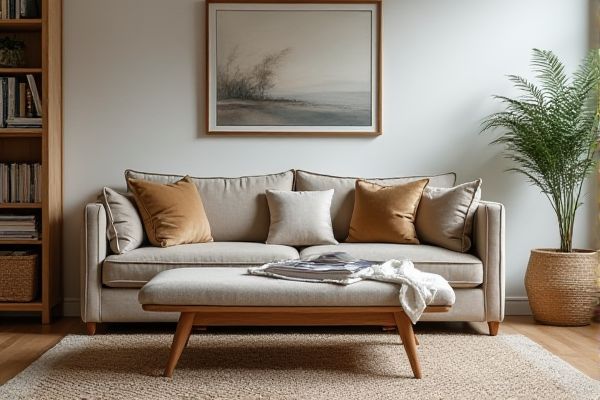
Upholstered ottomans provide a soft, cushioned surface ideal for comfort and relaxation, while wooden ottomans offer sturdy durability and a classic aesthetic that enhances any room's decor. Explore this article to find out which ottoman style best suits Your needs and living space.
Table of Comparison
| Feature | Upholstered Ottoman | Wooden Ottoman |
|---|---|---|
| Material | Fabric, leather, foam padding | Solid wood, veneer, hardwood |
| Comfort | Padded, cushioned for seating | Firm, no padding |
| Style | Soft, plush, versatile in design | Rustic, traditional, modern sleek |
| Durability | Moderate, fabric prone to stains | High, resistant to scratches and wear |
| Maintenance | Requires regular cleaning, spot treatment | Easy to clean with polish or wipes |
| Weight | Lighter, easier to move | Heavier, less portable |
| Storage | Often includes hidden storage space | May include storage but less common |
| Price Range | Affordable to mid-range | Mid-range to high-end |
| Best Use | Living rooms, bedrooms for comfort | Entryways, living spaces for durability |
Introduction to Ottomans: Upholstered vs Wooden
Upholstered ottomans offer plush comfort and a variety of fabric options, making them ideal for creating a cozy and stylish living space. Wooden ottomans provide durability and a classic aesthetic, often featuring intricate craftsmanship and easy maintenance. Choosing the right ottoman depends on your preference for softness and texture versus sturdiness and traditional design.
Design Aesthetics: Comparing Styles and Appeal
Upholstered ottomans offer a soft, cozy appearance with fabric or leather finishes that complement modern and traditional interiors, adding warmth and texture. Wooden ottomans present a sleek, minimalist look with visible wood grain and craftsmanship, ideal for rustic, farmhouse, or mid-century modern designs. The choice between upholstered and wooden ottomans significantly influences the room's visual appeal and tactile experience, blending comfort with style preferences.
Comfort and Ergonomics: Softness versus Firmness
Upholstered ottomans provide superior comfort and ergonomic support with their soft cushioning, making them ideal for resting your feet or sitting for extended periods. Wooden ottomans offer firm stability, promoting better posture but lacking the plush comfort of padded surfaces. Your choice depends on whether softness or firmness better suits your relaxation or functional needs.
Durability and Longevity: Material Matters
Upholstered ottomans offer comfort and style but may require more maintenance due to fabric wear and potential stains, impacting durability and longevity. Wooden ottomans, crafted from hardwoods like oak or teak, provide superior strength and resistance to everyday wear, often lasting decades with minimal upkeep. Choosing between the two depends on the balance between desired aesthetic comfort and the need for long-lasting, resilient furniture materials.
Maintenance and Cleaning: Ease of Care
Upholstered ottomans typically require regular vacuuming and occasional spot cleaning to maintain fabric integrity, with some materials needing professional cleaning to prevent stains. Wooden ottomans offer easier maintenance through simple dusting and wiping with a damp cloth, making them more resistant to spills and wear. Choosing your ottoman depends on how much effort you want to invest in ease of care and the tolerance for cleaning frequency in your living space.
Storage Capabilities: Functionality Differences
Upholstered ottomans often feature hidden storage compartments beneath their cushioned tops, providing versatile space to store blankets, magazines, or remote controls while doubling as comfortable seating. Wooden ottomans typically offer open or drawer-style storage, prioritizing sturdy organization for items like books or trays but lacking the plush comfort of padded tops. The choice between upholstered and wooden ottomans hinges on whether one values soft seating combined with concealed storage or durable, visible storage with a classic wooden design.
Versatility in Home Decor: Placement and Uses
Upholstered ottomans offer versatile placement options, serving as extra seating, footrests, or storage units that blend seamlessly into living rooms, bedrooms, or entryways. Wooden ottomans provide sturdy support with a classic aesthetic, ideal for benches or trays, and can be positioned in rustic or minimalist decor styles for added functionality. Your choice depends on whether you prioritize softness and comfort or durability and traditional charm in various home settings.
Price Comparison: Cost and Value Analysis
Upholstered ottomans generally cost more than wooden ottomans due to the added materials like fabric, foam, and craftsmanship involved in upholstery. Wooden ottomans offer greater durability and require less maintenance, providing better long-term value despite their lower upfront price. When considering cost and value, upholstered ottomans deliver enhanced comfort and style, while wooden ottomans excel in affordability and longevity.
Environmental Impact: Sustainability of Materials
Upholstered ottomans often use synthetic fabrics and foam, which can contribute to environmental pollution due to non-biodegradable materials and chemical treatments. Wooden ottomans sourced from responsibly managed forests offer greater sustainability, as wood is biodegradable and renewable when harvested ethically. Your choice of ottoman directly influences your environmental footprint, favoring natural, sustainably sourced wood for lower ecological impact.
Choosing the Right Ottoman: Factors to Consider
When choosing between an upholstered ottoman and a wooden ottoman, consider factors such as comfort, durability, and maintenance. Upholstered ottomans offer cushioned seating and a variety of fabric options, making them ideal for cozy living spaces, while wooden ottomans provide sturdiness and a classic aesthetic that complements traditional or rustic decor. Evaluate the intended usage, room style, and cleaning requirements to select an ottoman that balances functionality with design preferences.
 homyna.com
homyna.com